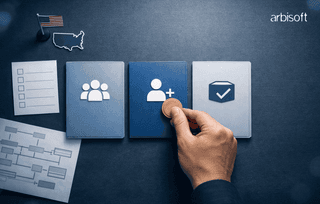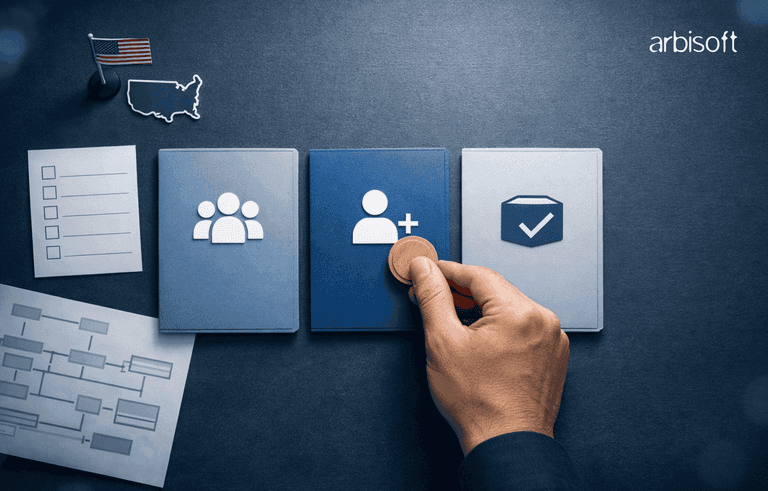We put excellence, value and quality above all - and it shows




A Technology Partnership That Goes Beyond Code

“Arbisoft has been my most trusted technology partner for now over 15 years. Arbisoft has very unique methods of recruiting and training, and the results demonstrate that. They have great teams, great positive attitudes and great communication.”
The Future of Work: Rethinking Talent Management in the Age of AI

Imagine a world where hiring decisions are free from bias, employee development is personalized to the individual, and employee engagement is consistently high. A study by Gartner predicts that by the end of 2024, AI will be used in 50% of all talent management processes across the globe.
AI is transforming the way organizations manage their talent, unlocking advanced insights through ai and data science services and opening up new possibilities for growth, productivity, and employee satisfaction. A recent survey by PwC found that 83% of HR professionals believe AI will significantly improve their ability to attract and retain top talent.
In this blog post, we'll explore how AI is reshaping the landscape of talent management, examining both the opportunities and challenges that lie ahead.
AI - The New Headhunter
Think about a world where the perfect candidate for your open position is identified within minutes, not months. AI-driven candidate sourcing platforms can proactively search for potential candidates on various social media platforms and job boards. Here are a few ways AI can simplify the process.
- Faster, Smarter Hiring - Resume screening algorithms can analyze thousands of applications in seconds, identifying the most qualified candidates based on specific criteria. For example, Unilever reduced its time-to-hire by 50% using AI, saving the company both time and money.
- Proactive Talent Sourcing - AI-driven platforms can proactively search for potential candidates on social media and job boards, expanding your talent pool beyond traditional channels. LinkedIn's Talent Insights tool, for instance, provides recruiters with data-driven insights into the skills and experience of potential candidates.
AI algorithms, while powerful, can also develop biases if the data they’re trained on isn’t carefully monitored These biases can then perpetuate discrimination and hinder diversity efforts.
AI and Employee Onboarding
AI can significantly enhance the employee onboarding process by providing personalized learning paths and support. Here are a few ways AI platforms can make this process more convenient and smooth.
- AI can tailor onboarding experiences to individual learning styles and preferences, including mentorship programs for new hires, ensuring new hires get the training they need when they need it.
- Chatbots and virtual assistants can provide 24/7 support, answering questions and guiding new employees through the onboarding process.
GE Healthcare saw a 30% reduction in new hire time-to-productivity because to their AI-powered onboarding platform. The platform provided personalized learning paths, facilitated communication with mentors, and tracked employee progress, ensuring a smooth and efficient transition.
AI is just a tool. To ensure a successful onboarding experience, organizations must integrate AI solutions seamlessly with their existing HR systems and processes. A fragmented approach can lead to confusion and frustration for new employees.
Stuck in the spreadsheet era? Level up your AI game and discover your HR AI maturity!

Discover your organization's AI maturity level and unlock the potential of AI in HR.

AI for Performance Management
AI-powered performance tracking tools can provide real-time insights into employee productivity, engagement, and development. Let’s take a look at how this is happening.
- AI can analyze data from various sources, including time-tracking systems, project management tools, and employee surveys, to provide real-time insights into employee performance, especially when combined with predictive analytics solutions that forecast future trends.
- Companies like Oracle are using AI to identify high-performing employees, enabling them to provide targeted development opportunities and rewards.
- AI can analyze employee performance data to identify individual strengths, weaknesses, and development needs. This enables organizations to create personalized development plans that help employees reach their full potential.
- AI-powered tools can provide employees with regular, automated feedback, helping them stay informed of their progress and identify areas for improvement.
- AI can eliminate bias and subjectivity from performance evaluations, ensuring that employees are assessed fairly and consistently.
But AI is not just about numbers. It's essential to consider the ethical concerns in AI development when using AI-generated insights for performance evaluation. By establishing transparent guidelines and ensuring fairness, organizations can use AI to improve performance management without compromising employee morale or ethical standards.
AI and Talent Development
Think about a world where learning is no longer a one-size-fits-all experience. AI-powered talent development platforms are revolutionizing the way organizations invest in their employees' growth. Here is how it works.
- Personalized Learning Paths - AI tools can analyze your skills, experience, and goals to create customized learning paths that help you develop the skills you need to succeed. For instance, IBM's Watson Talent platform uses AI to analyze employee skills and identify development gaps. The platform then recommends personalized learning paths and provides targeted coaching to help employees develop their skills.
- Intelligent Tutoring Systems - AI-powered tutors can provide personalized guidance, answer your questions, and offer real-time feedback on your progress.
- Microlearning - AI can break down complex topics into smaller, more digestible microlearning modules, making it easier for employees to fit learning into their busy schedules.
- Gamification - AI-powered learning platforms can incorporate gamification elements, such as points, badges, and leaderboards, to make learning more engaging and fun.
To ensure effective talent development, organizations must ensure that AI-generated training content is accurate, relevant, and up-to-date. But what happens after the talent has been developed? Engage!
AI and Employee Engagement
AI-driven engagement analytics can provide valuable insights into employee satisfaction, morale, and potential turnover risks. Imagine a world where you can proactively identify and address employee engagement issues before they escalate. With AI tools, you can swiftly solve this problem.
- Real-Time Insights - AI can analyze data from employee surveys, social media interactions, and other sources to provide real-time insights into employee satisfaction and morale.
- Predicting Turnover - By identifying early warning signs of disengagement, AI can help organizations take proactive steps to retain top talent. According to a study by Gartner, organizations that leverage AI for employee engagement can reduce turnover by up to 15%.
- Personalized Solutions - AI can recommend targeted interventions to improve employee engagement, such as offering additional training, providing more flexibility, or recognizing employees for their contributions.
Microsoft is a prime example of how AI can be used to enhance employee engagement. By analyzing employee sentiment and identifying potential engagement risks, Microsoft has been able to reduce employee turnover by 10%.
While AI can provide valuable insights, human interaction, and qualitative feedback remain essential for understanding the complex factors that influence employee engagement. The humans remain vital!
The Future of Talent Management
As AI continues to evolve, the landscape of talent management is ready for a radical transformation. Here are some key trends to watch:
- Hyper-Automation - AI-powered tools will automate routine HR tasks, freeing up HR professionals to focus on strategic initiatives. For example, Gartner predicts that by 2024, AI will automate 30% of HR tasks.
- Employee Well-being - AI-driven tools can help organizations monitor employee health and well-being, providing personalized support and interventions. A study by Deloitte found that companies that prioritize employee well-being see a 20% increase in productivity and a 15% reduction in turnover.
- Ethical AI in HR - As AI becomes more prevalent in HR, organizations must address ethical concerns related to data privacy, bias, and accountability. Failure to do so can lead to reputational damage and legal issues.
But the future of talent management isn't just about technology. It's also about human values and ethical considerations. As AI becomes more integrated into HR practices, organizations must ensure that technology is used to enhance human potential, not replace it.
A New Era of Talent Management
The future of talent management is bright, marked by Artificial Intelligence's transformative power. As AI continues to evolve, organizations that embrace these technologies will gain a competitive edge, improve employee satisfaction, and drive business growth.
However, it's essential to approach AI with a critical eye. While AI offers immense potential, it's crucial to address AI risks and benefits, ensure data privacy, and maintain a human-centric approach to talent management.
By striking the right balance between technology and human values, and leveraging a team augmentation service to bolster internal expertise, organizations can create a more efficient, effective, and employee-centric workplace. The future of talent management is a brave new world, and AI is the key to unlocking its full potential.
























